Propaganda photomontage on occasion of the reception of the Soviet army; source: lostbulgaria.com
Anastasia Balezdrova
This year marked the 71st anniversary of the coup of 9 September that imposed the communist rule in Bulgaria. Although it has been almost 25 years since the fall of the totalitarian regime, the events surrounding this memorable date have not yet been widely discussed and many facts remain quite obscure.
And if the propaganda in Bulgaria, and especially the terror at that time, did not allow anyone to say a word about how the country would sink into darkness and isolation over the course of the following 45 years, the press of neighbouring and other countries that had remained outside the sphere of the Soviet influence presented a clear picture of the events.
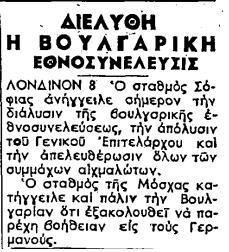 On 9 September 1944, the Athens newspaper "Eleftheria" published the following report, "Radio Sofia announced today the dissolution of the Bulgarian Parliament, the dismissal of the Chief of Staff of the armed forces and the release of all prisoners of war from the state of the Allies.
On 9 September 1944, the Athens newspaper "Eleftheria" published the following report, "Radio Sofia announced today the dissolution of the Bulgarian Parliament, the dismissal of the Chief of Staff of the armed forces and the release of all prisoners of war from the state of the Allies.
Radio Moscow again accused Bulgaria of continuing to assist the Germans."
Under the headline "The course of events in Bulgaria, the Russian troops are 30 km away from the Greek border" the newspaper wrote the following on 11 September 1944: "Last night radio Moscow disseminated an announcement of the Soviet government, stating, "Following the statements that the Bulgarian government has severed relations with Germany and declared war on it, calling for a truce at the same time, the Soviet government has ordered the suspension of hostilities against Bulgaria." The announcement also indicates that the Soviet government has discussed with the UK and the US governments the conditions of the truce that will be imposed on Bulgaria.
Radio Moscow also reported that, prior to the suspension of hostilities, the Russian troops that covered 150 km during their two-day offensive on the territory of Bulgaria had conquered the port of Burgas that is located 60 km north of the Turkish border, as well as other cities. The Soviet troops are 30 km away from the border with Greece.
During the battles that have taken place over the past two days, the Soviet forces have captured 4,000 Bulgarians and 4,000 Germans. 21,000 soldiers have been detained in Bulgaria.
The measures of the new government
Bulgaria’s new Prime Minister Kimon Georgiev occupied the post in 1934 too and he was the first to establish diplomatic relations with the Soviet Union. The new cabinet in Bulgaria has adopted a decision to establish a democratic system in the country. New Minister of Propaganda Kazasov said on the radio that all those who had collaborated with the Germans after 1 January 1941 as well as those who are responsible for the catastrophe of Bulgaria would be arrested and their property confiscated. All members of the Regency Council of the Kingdom of Bulgaria resigned."
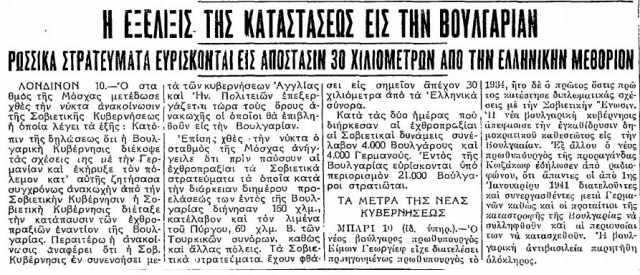
Those were followed by a few articles of correspondence about politicians who escaped abroad like Peter Gabrovski. He was found in Istanbul where the authorities imposed on him emergency orders to leave the country. Later Gabrovski was sentenced by the People's Court and executed in Sofia on 1 February 1945.
Less than a month after the coup, on 4 October 1944, "Eleftheria" newspaper wrote, "The Bulgarian Minister of Defence said in Sofia that Marshal Tolbukhin, commander of the Third Ukrainian Front, had taken command of the Bulgarian military forces.
According to other reports from Moscow the Regents of the Bulgarian throne, namely Prince Cyril, General Mihov and Professor Filov had been detained in Sofia until the conduct of a trial against them."
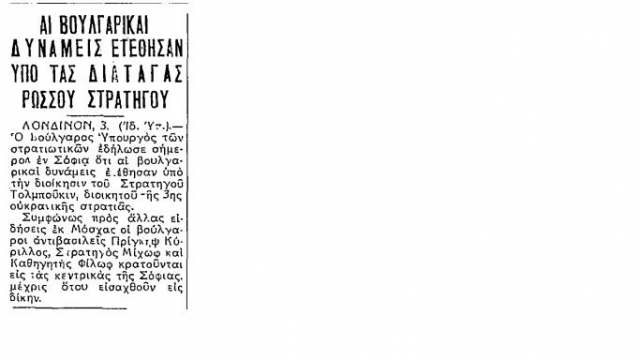
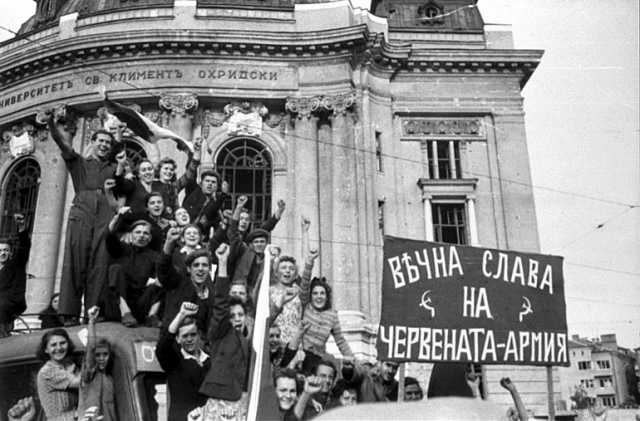
At the same time, the body of the Greek Communist Party "Rizospastis", the brotherly party of the Bulgarian Communist Party, reported on 18 November 1944 that all "anti-people" laws in Bulgaria had been cancelled, "In yesterday's statements the Bulgarian Minister of Justice announced the cancellation of all anti-people laws that had been in force in Bulgaria as well as the fact that women have been granted equal rights with men. Furthermore, people's courts have been organized throughout the country. With large rallies, the Bulgarian people require that the traitors who cooperated with the Germans and all war criminals should be punished. This desire of the people will be fulfilled."
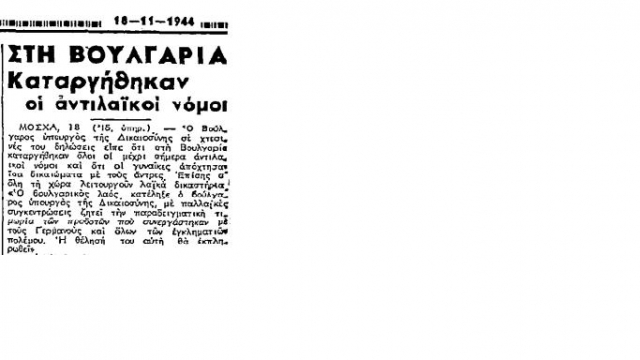
The communists kept their promise, according to some, and threat, according to others. Particularly eloquent about how they dealt with the opponents of the regime is the publication of "Embros" newspaper of 25 November 1945, "Telegrams from the institutions in Thrace region inform that, near the villages of Ormenio and Kastanies along Maritsa, the river has continuously cast ashore amputated and decapitated bodies of Bulgarians. It is believed that the bodies that are several dozen in number are of Bulgarian "reactionaries" killed by the supporters of Georgiev shortly before the elections to intimidate the population in order for the people to vote for the Communist front.